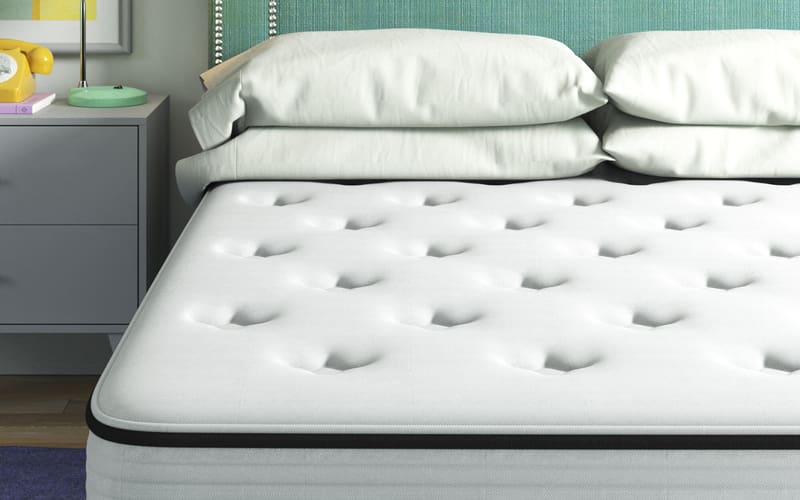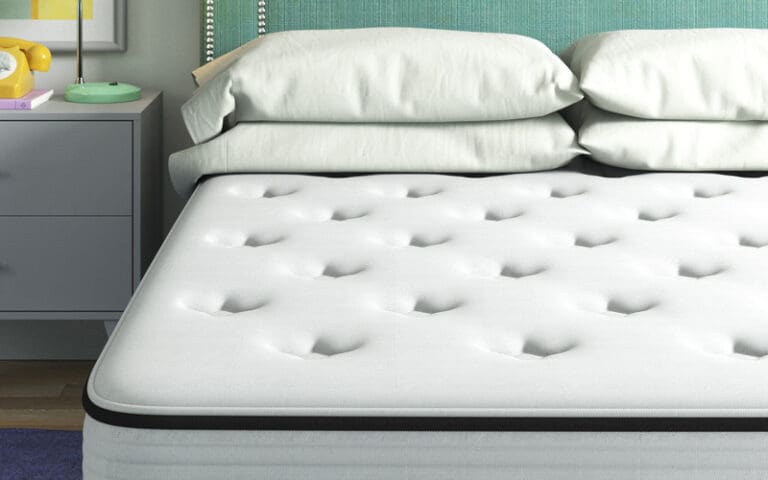We all know the feeling of sinking into your bed after a long day, but if you’re sinking too far, you may harm your body more than good. While there’s nothing wrong with preferring a softer sleep surface, everybody needs support to promote healthy spinal alignment.
Beyond just preference, choosing the right firmness level comes down to your specific sleep needs, body type, weight and sleeping position. That’s why in today’s guide, we will discuss can soft mattresses cause problems, what kind of problems can arise, what are some of the signs your bed might be too soft and what are the pros and cons of softer mattresses.

Problems a Soft Mattress Can Cause
Your sleeping position, body weight, and personal preferences influence selecting the right mattress firmness. Here are some issues that can arise from sleeping on a mattress that’s too soft:
- Overheating: Soft mattresses allow your body to sink deeper, trapping heat and making you overheat. Hot sleepers might prefer a different firmness level or a soft mattress topper for added comfort without excessive warmth.
- Joint Pressure for Heavier Individuals: People who weigh more than 8-10 stones may sink too deeply into a soft mattress, causing unnecessary pressure on their joints. A medium-firm or firm mattress is recommended for better spine alignment.
- Inadequate Support for Stomach Sleepers: Soft mattresses are generally unsuitable for stomach sleepers due to excessive sinkage, which can misalign the spine.
- Higher Cost: Soft mattresses often require multiple foam layers and other materials, making them more expensive than firmer options.

5 Signs Your Mattress Is Too Soft
If you’re experiencing any of the following issues, your mattress might be too soft:
Stiff and Sore Lower Back
A common symptom of a too-soft mattress is waking up with a stiff and sore lower back, indicating poor spinal support.
Neck or Shoulder Pain
Stomach sleepers, in particular, may experience neck and shoulder pain due to the unnatural twisting required by their sleep position on a soft mattress.
Difficulty Getting Comfortable
If you constantly toss and turn, it might be a sign that your muscles can’t fully relax due to insufficient support.
Struggling to Get In and Out of Bed
A “stuck” feeling when trying to get out of bed suggests your mattress is too soft, especially with materials like low-density memory foam.
Excessive Sinking
If you feel like you’re sinking too deeply, down to the support layers, your mattress is either too soft or worn out.
Side Effects of Sleeping on a Soft Mattress

An overly soft mattress can lead to various health issues, including:
Back Pain
Inadequate support can force your body into unnatural positions, causing back pain. When your mattress is too soft, it fails to keep your spine in proper alignment, leading to muscle strain and discomfort. Over time, this can contribute to chronic back issues that affect your overall quality of life.
Obesity
Poor sleep quality can lead to drowsiness and overeating, increasing the risk of obesity. Sleep deprivation affects the hormones that regulate hunger, causing an increase in appetite and cravings for unhealthy foods. Additionally, the lack of energy resulting from inadequate sleep can reduce your motivation to exercise, further contributing to weight gain.
Drowsiness
Lack of quality sleep results in tiredness and reduced alertness. When you don’t get enough restorative sleep, it impacts your ability to focus, concentrate, and perform daily tasks efficiently. This persistent fatigue can affect your productivity at work or school and increase the risk of accidents.
Weak Immune System
Insufficient sleep weakens your immune system, making you more susceptible to illness. During sleep, your body produces cytokines, which are essential for fighting infections and inflammation. A soft mattress that disrupts your sleep can hinder this process, leaving you more vulnerable to common colds, flu, and other infections.
Heart Conditions
Chronic lack of sleep is linked to a higher risk of heart disease, stroke, and high blood pressure. Poor sleep can lead to an increase in stress hormones like cortisol, which can elevate blood pressure and strain the heart. Over time, these effects can contribute to serious cardiovascular problems.
Memory Issues
Sleep deprivation negatively affects memory formation and recall. Sleep plays a crucial role in consolidating memories and processing information learned during the day. Without sufficient sleep, your brain struggles to store and retrieve memories, impacting your cognitive function and learning ability.
Premature Ageing
Poor sleep can lead to visible signs of ageing, such as dark circles under the eyes. Chronic sleep deprivation can cause your skin to lose its elasticity and develop wrinkles and fine lines. Additionally, inadequate sleep disrupts the body’s ability to repair and regenerate skin cells, accelerating the ageing process.
Reduced Libido
Lack of sleep decreases energy levels and sex drive, and can lead to lower testosterone levels in men. Fatigue and stress resulting from poor sleep can diminish your interest in sexual activity. For men, insufficient sleep is also linked to reduced testosterone production, which can affect both libido and overall reproductive health.
Why Mattress Firmness Matters
Choosing the right mattress firmness is essential for preventing back pain and improving sleep quality. A mattress that maintains proper spinal alignment can significantly enhance your overall well-being.
Bottom line
Finding a supportive yet soft mattress can be challenging, but it’s crucial to balance support and comfort for a refreshing and peaceful night’s sleep. Consider factors like materials, support, motion isolation, and cooling properties when making your choice.
Soft mattresses come with both pros and cons. It’s essential to consider your individual needs, body type, weight, and sleeping position to make the best decision for your health and comfort.

